|
|
|
Sort Order |
|
|
|
Items / Page
|
|
|
|
|
|
|
| Srl | Item |
| 1 |
ID:
082623


|
|
|
|
|
| Publication |
2008.
|
| Summary/Abstract |
Recent intelligence failures, including first and foremost the mistaken estimate of Iraq's weapons of mass destruction (WMD) prior to the war, show that a prime source of such failures is the adherence by analysts to preconceptions (or mind-sets) which entail the rejection of new information that contradicts it. The source of this kind of problem lies in well known psychological mechanisms. Yet official investigations into intelligence blunders have typically ignored this problem or have not suggested an appropriate solution thus far. Our paper suggests an original approach based on the fact that certain types of personalities are more likely than others to fall victim to these biased judgments. Existing psychological tests can help determine individual susceptibility to such tendencies. Therefore we suggest that intelligence organizations should pay far more attention to these personality characteristics, especially an analyst's level of openness, in recruitment, training, and promotion. Such attention would help create more effective reforms in intelligence than organizational models which advocate "devil's advocate" kind of solutions.
|
|
|
|
|
|
|
|
|
|
|
|
|
|
|
|
| 2 |
ID:
082622


|
|
|
|
|
| Publication |
2008.
|
| Summary/Abstract |
Existing formal models of political behavior have followed the lead of the natural sciences and generally focused on methods that use continuous-variable mathematics. In 2002, Stephen Wolfram produced an extended critique of that approach in the natural sciences, and suggested that a great deal of natural behavior can be accounted for using rules that produce discrete patterns. This paper reports some initial findings designed to apply this pattern-based method to political event data. We believe that discrete sequence rule (DSR) models can provide a new social science methodology that is capable of preserving the agential basis of social interaction, tracking multiple agents as they enact rules through behavior directed at one another, and capturing the evolution of such interaction over time. The core of this project is a new, publicly accessible Web-based tool designed for the visualization and analysis of event data patterns Using event data on the Israel-Palestine conflict generated by the TABARI automated coding program of the Kansas Event Data System (KEDS) for the period 1979-2004, we perform an initial exploration of this methodology. Specifically, we identify patterned behavior for which specific rule use can be imputed, and then examine several agent-based rules, plus four "meta-rules," to parse Israeli-Palestinian interaction over time. Face validity of the analysis is apparent, and we also find the qualitative historical record can be augmented through observation of rule enactment in the event stream. Several descriptive empirical applications are demonstrated, including moving totals and increasingly complex sequences of rule enactment that go beyond the simple variations on tit-for-tat responses. While this paper represents an exploratory analysis of the method, the results are promising enough to warrant further investigation beyond its use in thick description as demonstrated here, to ultimately include hypothesis generation and falsification
|
|
|
|
|
|
|
|
|
|
|
|
|
|
|
|
| 3 |
ID:
082625


|
|
|
|
|
| Publication |
2008.
|
| Summary/Abstract |
To what extent are ethnic identity groups able to influence U.S. foreign policy toward their ancestral homelands? Existing research has resulted in the enumeration of an extensive list of criteria thought to condition ethnic minority influence. In spite of significant progress, however, the literature lacks of systematic test of any of these criteria. The result is a literature that cumulates largely though the addition of new criteria, rather than the reevaluation of existing factors. The current study represents an attempt to develop a test of existing criteria though the application of Qualitative Comparative Analysis (QCA). Specifically, the study uses QCA to examine six of the most widely cited criteria found in the literature. Results indicate that, of the six criteria, only organizational strength and level of political activity are necessary conditions for successful influence. No individual factors are sufficient causes of influence
|
|
|
|
|
|
|
|
|
|
|
|
|
|
|
|
| 4 |
ID:
082624


|
|
|
|
|
| Publication |
2008.
|
| Summary/Abstract |
Recent scholarship on foreign policy change focuses on the role of ideas in altering policies and related governing institutions. While a welcome antidote to the previous preoccupation with static analysis, this research has yet to provide adequate understanding of whether and how ideas produce change in specific instances. This study seeks to narrow this gap by examining a recent program change in U.S. foreign aid policy: the creation in 2004 of the Millennium Challenge Corporation (MCC), an independent agency designed to reward the world's most impoverished countries that had previously undertaken neoliberal economic reforms and democratic political reforms. The study identifies a convergence of widely shared principled and causal beliefs which, mediated through U.S. domestic structures, produced the most significant change in U.S. aid strategy and structures in nearly half a century. In melding societal theories that emphasize the role of transnational norm diffusion with theories of domestic politics, the study answers the call for multilevel explanations of foreign policy change. And by applying constructivist notions of ideas and discursive framing with rationalist conceptions of power and interests, the study further responds to the need for theoretical synthesis in the study of foreign policy
|
|
|
|
|
|
|
|
|
|
|
|
|
|
|
|
| 5 |
ID:
082626


|
|
|
|
|
| Publication |
2008.
|
| Summary/Abstract |
We develop a theory of foreign policy voting in the Senate premised on the assumption that foreign policy programs are a mostly collective good whose costs and benefits accrue to all, but which generate insufficient political benefits to make such policies politically popular, and often make it difficult for senators to support presidents. While certainly at times in U.S. history, presidents have enjoyed remarkable levels of such support (e.g., during the early years of the Cold War), more often than not, politics do not stop at the water's edge. Why should this be so? We seek to provide scholars a more comprehensive understanding regarding the underlying proclivity of legislators to support the President given the public goods costs of foreign and defense policy and based upon the issue at stake, the political environment and common partisan and ideological preferences. After elaborating upon this account of foreign policy voting, we test our hypotheses by examining the voting behavior of individual senators on all foreign policy related roll call votes in the U.S. Senate from 1979-2000 on which the President clearly expressed a preference, and find strong support for our expectations
|
|
|
|
|
|
|
|
|
|
|
|
|
|
|
|
|
|
|
|
|